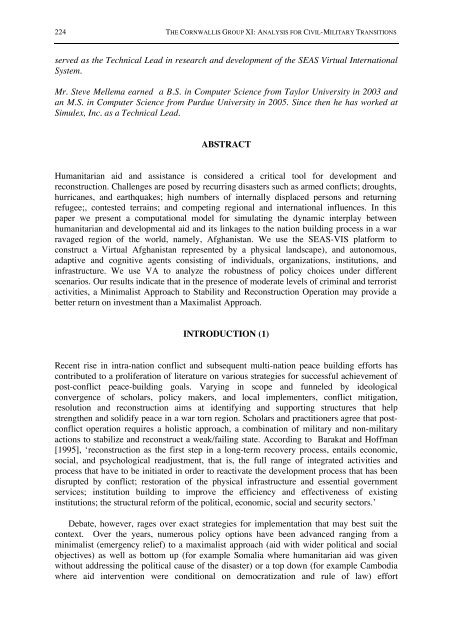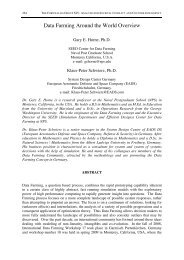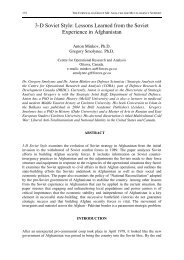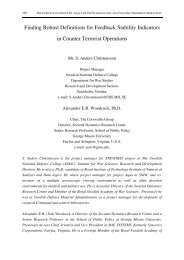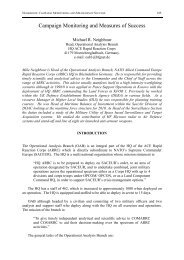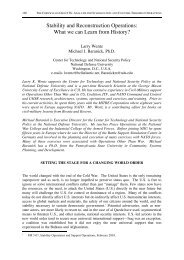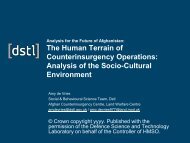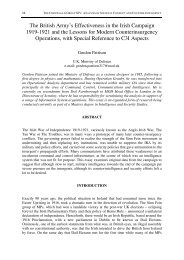Modeling Stability and Reconstruction Operation ... - Cornwallis Group
Modeling Stability and Reconstruction Operation ... - Cornwallis Group
Modeling Stability and Reconstruction Operation ... - Cornwallis Group
Create successful ePaper yourself
Turn your PDF publications into a flip-book with our unique Google optimized e-Paper software.
224 THE CORNWALLIS GROUP XI: ANALYSIS FOR CIVIL-MILITARY TRANSITIONSserved as the Technical Lead in research <strong>and</strong> development of the SEAS Virtual InternationalSystem.Mr. Steve Mellema earned a B.S. in Computer Science from Taylor University in 2003 <strong>and</strong>an M.S. in Computer Science from Purdue University in 2005. Since then he has worked atSimulex, Inc. as a Technical Lead.ABSTRACTHumanitarian aid <strong>and</strong> assistance is considered a critical tool for development <strong>and</strong>reconstruction. Challenges are posed by recurring disasters such as armed conflicts; droughts,hurricanes, <strong>and</strong> earthquakes; high numbers of internally displaced persons <strong>and</strong> returningrefugee;, contested terrains; <strong>and</strong> competing regional <strong>and</strong> international influences. In thispaper we present a computational model for simulating the dynamic interplay betweenhumanitarian <strong>and</strong> developmental aid <strong>and</strong> its linkages to the nation building process in a warravaged region of the world, namely, Afghanistan. We use the SEAS-VIS platform toconstruct a Virtual Afghanistan represented by a physical l<strong>and</strong>scape), <strong>and</strong> autonomous,adaptive <strong>and</strong> cognitive agents consisting of individuals, organizations, institutions, <strong>and</strong>infrastructure. We use VA to analyze the robustness of policy choices under differentscenarios. Our results indicate that in the presence of moderate levels of criminal <strong>and</strong> terroristactivities, a Minimalist Approach to <strong>Stability</strong> <strong>and</strong> <strong>Reconstruction</strong> <strong>Operation</strong> may provide abetter return on investment than a Maximalist Approach.INTRODUCTION (1)Recent rise in intra-nation conflict <strong>and</strong> subsequent multi-nation peace building efforts hascontributed to a proliferation of literature on various strategies for successful achievement ofpost-conflict peace-building goals. Varying in scope <strong>and</strong> funneled by ideologicalconvergence of scholars, policy makers, <strong>and</strong> local implementers, conflict mitigation,resolution <strong>and</strong> reconstruction aims at identifying <strong>and</strong> supporting structures that helpstrengthen <strong>and</strong> solidify peace in a war torn region. Scholars <strong>and</strong> practitioners agree that postconflictoperation requires a holistic approach, a combination of military <strong>and</strong> non-militaryactions to stabilize <strong>and</strong> reconstruct a weak/failing state. According to Barakat <strong>and</strong> Hoffman[1995], ‘reconstruction as the first step in a long-term recovery process, entails economic,social, <strong>and</strong> psychological readjustment, that is, the full range of integrated activities <strong>and</strong>process that have to be initiated in order to reactivate the development process that has beendisrupted by conflict; restoration of the physical infrastructure <strong>and</strong> essential governmentservices; institution building to improve the efficiency <strong>and</strong> effectiveness of existinginstitutions; the structural reform of the political, economic, social <strong>and</strong> security sectors.’Debate, however, rages over exact strategies for implementation that may best suit thecontext. Over the years, numerous policy options have been advanced ranging from aminimalist (emergency relief) to a maximalist approach (aid with wider political <strong>and</strong> socialobjectives) as well as bottom up (for example Somalia where humanitarian aid was givenwithout addressing the political cause of the disaster) or a top down (for example Cambodiawhere aid intervention were conditional on democratization <strong>and</strong> rule of law) effort


